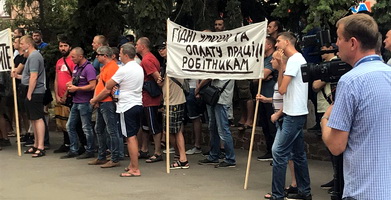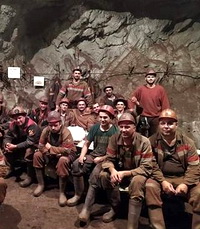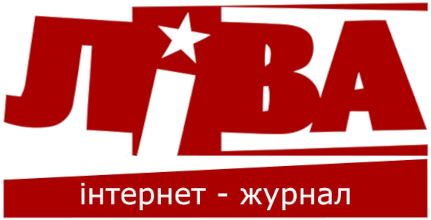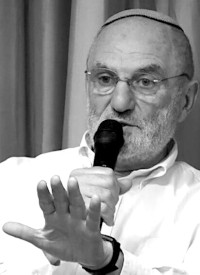
"This is not a strike, but a protest action." Yuriy Samoilov, chairman of the Krivoy Rog (Kryvyi Rih) organization of the Independent Trade Union of Miners of Ukraine, prefers to clarify this point when talking about the undergroundprotestoflocalminers. Workers of the privatized Krivoy Rog Iron Ore Plant (KZhRK) are afraid to officially call their actions a "strike" -- because of pressure from the Ukrainian authorities.
Protesters remember the sad experience of striking uranium miners when the leaders of the movement were put on trial. The government seeks to punish the organizers of strikes, and the security services conduct a targeted fight against such people -- which leaves an imprint on the tactics and rhetoric of the protesters. “There are no leaders in our movement,” says Yuri Samoilov.
On Sept. 2, about 30 miners at the Oktyabrskaya mine refused to come to the surface after their shift. Later, others joined them -- at the peak of the underground action, the number of participants reached 300 people. Their demands are of an economic nature: an increase in wages to 1,000 euros, an improvement in unbearable working conditions and the preservation of professional benefits for underground workers. However, the owners are categorically opposed -- from the beginning of the underground action at the mines, they introduced "police management," when the actual leadership is carried out by the internal security service. The workers and their families are being interrogated by the Security Service of Ukraine (SBU). And the yellowtradeunion in the bosses’ pocket does not organize any protest actions and has stopped communicating with the KZhRK workers altogether.
Similar actions are now taking place in many countries around the world -- because the capitalist crisis has intensified the attack on the rights of the working class. However, a number of circumstances make these events especially important -- and, in a sense, unique for modern Europe.
First, we must speak about the essential role of women who actively participate in the protest movement. Actions in support of the miners are not only held underground. They are supported by rallies near the city administration of Krivoy Rog, as well as in Kiev -- near the Verkhovna Rada (parliament) and the president's office. Half of the participants in the Krivoy Rog demonstrations are women, full-fledged current workers at the KZhRK. The plant employs about 2,000 women miners. They perform crushing and screening operations, control lifting installations that ensure the movement of mined ore, and work with explosive materials. In a word, they do almost everything that men working at the plant do.
Some time ago, a recertification of working conditions was carried out at the KZhRK, as a result of which the consequences of harmful and especially hard work was left to the miners alone. According to the new conditions, women working here will have to retire at 60 years old, instead of the previous 45 years. At the same time, the wages of women miners are equal to 150-200 euros -- although men receive 700 or 800 euros. It is noteworthy that it was not a local, but a Kharkov company, chosen to conduct the recertification -- because its owner, Alexander Yaroslavsky, also owns mines in Krivoy Rog.
The second feature of the movement is that it is supported not only by representatives of labor collectives, but by almost all residents of Krivoy Rog. After all, they are interested in the workers receiving decent wages and working in safe conditions. The mayor and city councilors invited representatives of the miners’ union to meetings and promised to support the miners' demands. In the center of Krivoy Rog, there is a strikers' tent camp, which is maintained not only by the families of the protesters, but also with the assistance of local authorities. And ordinary townspeople support the miners with financial aid, publicity and messages on social media.
The place where the events unfold is also remarkable. The ultimate beneficiary of KZhRK is the richest man in Ukraine, billionaire Rinat Akhmetov, who bought one of the most expensive houses in the world at the beginning of 2020 -- the luxury villa Les Cèdres in France. On the other hand, Krivoy Rog is the birthplace of President Volodymyr Zelensky. He grew up in this city; many of the protesters knew him personally. However, the president has not yet expressed his opinion on the miners' protests and does not plan to meet with them. Moreover, according to Yuri Samoilov, Zelensky's team is supporting Akhmetov in the local elections to be held in November 2020. And it is not surprising that the authorities do not interfere with attempts to crush the protest action.
The striking miners are writing appeals to parliament, government bodies and the presidential administration, but have not yet received any response. The same letters were sent to the human rights commissioner, the United Nations mission and other international institutions, which also remain indifferent to what is happening in Krivoy Rog. The protesters wanted to set up a tent city in the capital in front of the Rada, but they were dispersed by the police, clearly showing what rights Ukrainians obtained as a result of the Euromaidan. The international community is watching in silence, preferring not to react to social protests against Ukrainian oligarchs.
However, the struggle continues -- on the 20th day of the protest, there are over 170 workers underground, who gradually manage to overcome the information blockade of the Ukrainian media controlled by the oligarchy. The action in the mine is already yielding partial results: the administration of the KZhRK promised to increase the salaries of women working at the plant by 25 percent. But this is the only concession the oligarchs have agreed to so far -- because they are waging a real class war against the protesters, and are determined to win.
The significance of the underground action in Krivoy Rog is especially important in view of the forthcoming changes in labor laws. The Ukrainian authorities, which successfully combine nationalism with neoliberalism, are determined to impose a new anti-worker Labor Code on the country. The situation of workers will deteriorate hopelessly if they fail to effectively protest this arbitrariness. And the success of the miners would be an important example in this sense, because their struggle is the struggle of the entire working class of the country.
According to Yuri Samoilov, the most important condition for the success of the current struggle is solidarity, including at the international level. Progressive forces around the world should pay attention to the systemic violation of human rights that is taking place in modern Ukraine, where constitutional norms and international agreements in the field of labor and civil rights, formally signed by Kiev officials, are being violated.
The European Union is concerned about pressure on the opposition in Belarus, but Ukraine is an even worse example of the suppression of the social and political rights of its citizens. It is shameful and hypocritical to ignore this. The women of the Krivoy Rog plant do not wear white dresses, but they also need protection from arbitrariness. Workers protesting underground deserve general sympathy and support.
By Olesya Orlenko
Translated by Greg Butterfield
-
Історія
Африка и немцы - история колонизации Намибии
Илья Деревянко история колонизации Намибии>> -
Економіка
Уолл-стрит рассчитывает на прибыли от войны
Илай Клифтон Спрос растет>> -
Антифашизм
Комплекс Бандеры. Фашисты: история, функции, сети
Junge Welt Против ревизионизма>> -
Історія
«Красная скала». Камни истории и флаги войны
Андрій Манчук Создатели конфликта>>













 RSS
RSS





